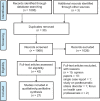A Review of Biographical Work in Palliative Care
- PMID: 31413463
- PMCID: PMC6659523
- DOI: 10.4103/IJPC.IJPC_16_19
A Review of Biographical Work in Palliative Care
Abstract
Aim: We find several interventions in palliative care to cover psychosocial needs and to relieve distress of patients. There is a growing interest in therapies using biographical approaches, but discussion about interventions is sparse, and there is no concept for comprehensive and sustainable provision. Research on interventions with a single biographical approach is available, but there is no systematic review that tests a range of interventions. Therefore, we look at all studies using biographical approaches for patients and/or caregivers.
Methods: In May 2017, the electronic databases of Medline, PubMed, EMBASE, Central, and PsycINFO were searched for qualitative and quantitative empirical reports. Interventions for patients, dyads of patient and caregiver, and bereaved caregivers were included. Data analysis follows the guideline PRISMA.
Results: Twenty-seven studies were included - 12 using a quantitative evaluation and 15 using a qualitative evaluation. Interventions using biographical approach are widespread and show broad variations in comprehension and performance. The scope of interest lays on patient and family in trajectory of illness and bereavement. The most common interventions used were life review, short life review, dignity therapy, and bereaved life review. Biographical approaches increase quality of life and spiritual well-being and reduce depression. Interventions show effects independently of the number of sessions or provider.
Conclusions: Transferability of concepts seems limited due to the implications of culture on themes emerging in interventions. In some case, there were predicting factors for responders and nonresponders. Further research is needed.
Keywords: Biography; life review; narration; palliative care; terminal care.
Conflict of interest statement
There are no conflicts of interest.
Figures





References
-
- Boston P, Bruce A, Schreiber R. Existential suffering in the palliative care setting: An integrated literature review. J Pain Symptom Manage. 2011;41:604–18. - PubMed
-
- Beasley E, Brooker J, Warren N, Fletcher J, Boyle C, Ventura A, et al. The lived experience of volunteering in a palliative care biography service. Palliat Support Care. 2015;13:1417–25. - PubMed
-
- Radbruch L, Payne S. White paper on standards and norms for hospice and palliative care in Europe: Part 1. Eur J Palliat Care. 2009;16:278–89.
-
- Dong ST, Butow PN, Tong A, Agar M, Boyle F, Forster BC, et al. Patients’ experiences and perspectives of multiple concurrent symptoms in advanced cancer: A semi-structured interview study. Support Care Cancer. 2016;24:1373–86. - PubMed
-
- Higgins JPT, Green S, editors. Cochrane Handbook for Systematic Reviews of Interventions Version 5.1.0. The Cochrane Collaboration. 2011. [[updated 2011 Mar] [Last accessed on 2017 May 15]]. Available from http://handbook.cochrane.org .
Publication types
LinkOut - more resources
Full Text Sources

